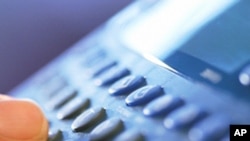The U.N.'s World Food Program (WFP) and the mobile telecommunications company Vodafone are piloting a project that will allow shopkeepers in Burkina Faso to manage food vouchers by text message.
The World Food Program and The Vodafone Foundation, a division of the British mobile phone company, have started to bring technology to the food voucher program in place in Burkina Faso.
The partnership will allow shopkeepers in two towns in Burkina Faso to manage food vouchers through text messaging, or SMS. Paul McCann is Vodafone's Program Delivery Manager in West Africa.
"We're keen here to try this SMS solution out. It's fairly simple, it uses standard technology and it doesn't rely on supplying that technology to the beneficiary, only to the shopkeeper," McCann explained. "It's currently at the planning stage, the program itself is currently being planned and that's scheduled to start in February."
Around 30,000 people currently receive food vouchers in Burkina Faso. Until now the hologram-imprinted vouchers were distributed to families who need them. They are then exchanged for goods in shops and shopkeepers are reimbursed in cash by the World Food Program once a month.
If the pilot is successful, shopkeepers will be able to validate the vouchers by cell phone on the spot. In theory the World Food Program would then be able to reimburse them the next day, either by bank transfer or by check.
McCann said the new system would eradicate the possibility of voucher fraud.
"Text messages will be exactly one way of doing it so what would effectively happen is that the vouchers would be presented by the beneficiary," he added. "When they get to the store they hand over the voucher and the beneficiary card, which identifies who they are. The storekeeper would key those details into effectively a message, which would be formatted by an application setting on the phone, which would then create an SMS, send that back to the database at WFP headquarters. And the idea is that if you can do that you can pretty well eliminate the potential for fraud.
While McCann is hopeful for the new scheme, he said it is unlikely that food vouchers will be distributed to families by text message.
"The disadvantage...that's a great system and I think it works really well and we've seen an explosion of use of that in East Africa where it's been tried out, not specifically about WFP and vouchers, but the cash transfer system has worked really well. We don't want to start excluding potential beneficiaries because they don't have access to a phone," he said. "The only phone that's needed in the system that we're talking about is one with the storekeeper."
This is the first time that the Vodafone-World Food Program partnership has benefited West Africa.
McCann, who will leave West Africa in June, said his time in the region has furthered his understanding of how mobile phone technology can benefit the humanitarian relief effort.
"This was advertised internally in Vodafone and as soon as I saw it I thought, this is something I'd really like to do, a new country, a new working environment," he recalled. "And the other reason is that an organization like WFP is simply a fantastic organization. So I'm going to take away a better understanding of how organizations like this work."
The food voucher program is not the only project to come of the partnership in West Africa.
"I'm working on a number of others, one here for instance to provide a platform for the humanitarian community to be able to share information," added McCann. "So what we're trying to do is provide an open platform, particularly during emergency preparedness."
Vodafone is the widest-reaching cell phone provider in the world but it has a limited presence in West Africa. Its partnership with the World Food Program has benefited the disaster and emergency relief response worldwide and Vodafone's technology is currently being used to facilitate the World Food Program's work reaching earthquake survivors in Haiti.
WFP, Vodafone Distribute Food Vouchers in Burkina Faso
- By Kate Thomas




